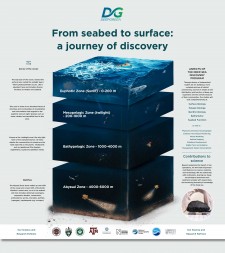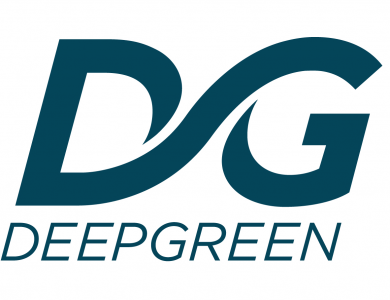DeepGreen Teams Up With Leading Research Institutions to Understand and Minimise Impacts of Collecting Minerals for Electric Vehicles and Clean Energy From the Deep Sea

VANCOUVER, British Columbia, August 25, 2020 (Newswire.com) - DeepGreen Metals Inc., today announced it has formalized partnerships with leading scientific research institutions and internationally-renowned universities in a significant investment into its ongoing deep-sea discovery program to characterize the potential impacts of lifting polymetallic nodules up from the bottom of the Clarion Clipperton Zone (CCZ) of the Pacific Ocean.
- The battery metals start-up is investing over U.S. $60 million to accelerate a massive collaborative program to address outstanding questions on the potential environmental impacts of collecting polymetallic nodules from the deep seabed in the Pacific Ocean
- Top experts from UK National Oceanography Centre, Natural History Museum (London), University of Gothenburg, University of Leeds, Heriot-Watt University — the Lyell Centre, Florida State University, University of Hawaii, Japan Agency for Marine-Earth Science and Technology, and Texas A&M will join the effort, while fully maintaining their academic independence and building society’s knowledge of the deep sea
- Ground-breaking in both scope and scale, the program will involve over 100 researchers to study the entire water column — from seabed to surface — involving ROVs, nets, sail drones and sophisticated sensors and moorings
The program will include dozens of discrete studies of pelagic and benthic biology, bathymetry and ecosystem function of the CCZ as part of DeepGreen’s environmental and social impact assessment (ESIA) for its proposed polymetallic nodule collection project. The data collected will enable informed decision-making and regulatory development in advance of the commencement of a new resource industry which has the potential to provide billions of tonnes of the critical battery metals required for society’s transition to clean energy.
The participation of independent scientific institutions in DeepGreen’s ESIA underscores the company’s commitment to transparency during the exploration phase of an industry that some NGOs oppose on the grounds that there is currently insufficient information about the deep sea to make informed decisions about impacts.
“This is a collaboration of the best minds in ocean science coming together to answer many important questions about deep-sea ecosystem function and connectivity throughout the water column,” said DeepGreen Chief Ocean Scientist, Dr. Greg Stone. “The program will enable DeepGreen to put forward a rigorous, peer-reviewed environmental impact statement to the International Seabed Authority, setting a high bar for this new industry.”
One of the primary concerns that researchers will address is the impact of sediment plumes on deep-ocean fauna throughout the water column, and at varying spatial and temporal scales.
“We are pleased to take part in this important, wide-reaching and collaborative effort to study the impacts of collecting polymetallic nodules. We are also encouraged by DeepGreen’s proactive approach, desire to support high-quality science and commitment to make all of our findings publicly available,” said Dr. Daniel Jones from the UK National Oceanography Centre, whose team will investigate the seabed megafauna of the region.
The global team of environmental scientists will work to deliver a state-of-the-art baseline biological survey of DeepGreen’s NORI exploration area to meet or exceed international regulatory requirements under the International Seabed Authority (ISA), established by the UN Convention on the Law of the Sea (UNCLOS). DeepGreen will use the insights and knowledge gained from the comprehensive survey to inform engineering decisions in order to further develop technologies to collect and uplift polymetallic nodules with as little impact as possible to the ocean.
Contribution to wider science
The multi-year, integrated research program will characterize the marine environment and species from the seabed of the abyssal plain up through the water column, to the surface of the ocean, studying everything from microbes to whales. All output and data generated by this intensive research program will be shared with the international community, and samples collected from the deep sea will be sent to labs around the world for analysis. This collaborative effort will advance the wider fields of ocean science, medicine and technology.
The deep ocean has proven to be fertile ground for important scientific breakthroughs in recent years, including the isolation of enzymes critical to testing for coronaviruses, and DeepGreen is hopeful that, with a large catalogue of biological and deep-sea sediment samples in hand, researchers will be able to unlock the vast potential of these common heritage resources and advance the frontiers of deep-ocean science.
Mission to supply metals for the clean energy transition
With society’s demand for battery metals booming due to the transition to clean energy and electric vehicles, DeepGreen believes that polymetallic nodules from the deep sea — a rich, concentrated source of nickel, copper, manganese and cobalt — present significant opportunities to reduce the most serious impacts that arise from mining metals on land.
Deep-sea nodules have never been collected on a commercial scale. The work of the research team that DeepGreen has assembled will help to prepare a body of scientific evidence around potential impacts to enable the international community, through the ISA, to assess the likely environmental impacts of nodule collection in DeepGreen’s NORI area and make evidence-based decisions on granting exploitation contracts to DeepGreen and its sponsoring states.
-- ENDS --
For a wide variety of high-res image options, please write rory.usher@deep.green.
About DeepGreen
DeepGreen Metals Inc., is a polymetallic nodules exploration and development company on a dual-mission: (1) supply metals for the green transition with the least possible negative environmental and social impact and (2) accelerate the transition to a circular metal economy. The company holds exploration rights to three polymetallic nodule contract areas in the Clarion Clipperton Zone sponsored by the governments of Nauru, Kiribati and the Kingdom of Tonga, and regulated by the International Seabed Authority. DeepGreen has developed a process for producing metals from polymetallic nodules with near-zero solid waste, eliminating the need for tailings dams on land. More information about DeepGreen is available at www.deep.green.
Media Contacts
Dan Porras | Head of Brand and Executive Communications | +1 (415) 722-0602 | dan@deep.green
Rory Usher | PR & Media Manager | +44 7470 200232 | rory.usher@deep.green
Source: DeepGreen Metals Inc.
